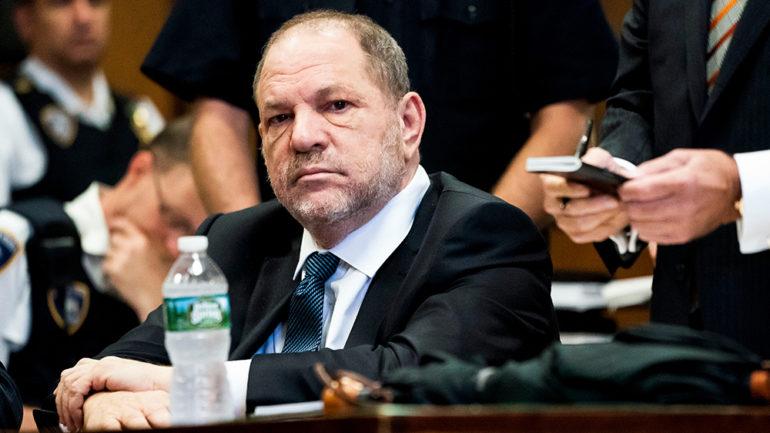Some Weinstein Accusers Balk at $30 Million Settlement
By Gene Maddaus
LOS ANGELES (Variety.com) – Updated: Some of Harvey Weinstein’s accusers are balking at a proposed $30 million settlement of their harassment claims, which could scuttle the deal, Variety has learned.
Attorneys in the Weinstein Co. bankruptcy case told Judge Mary Walrath on Thursday that they are close to a global resolution of the civil litigation. The accusers, their lawyers and various trade creditors of the Weinstein Co. would get $30 million, while another $14 million would go to attorneys for the Weinstein Co. board members, who were defendants in several of the lawsuits. The amounts — first reported by the Wall Street Journal and confirmed by Variety — would be paid by the company’s insurers.
However, Variety has learned that other plaintiffs who were part of the negotiations are not satisfied with the proposed settlement amount. That could undercut the entire deal, if the Weinstein Co. insurers are unwilling to reach a resolution that carves out some of the lawsuits and leaves them exposed to further liability.
In a statement on Friday afternoon, attorneys Douglas Wigdor and Kevin Mintzer blasted the proposed settlement, saying it would provide millions to the Weinstein Co. board members and allow Harvey and Bob Weinstein to evade accountability. Wigdor and Mintzer represent Wedil David, who alleges that Weinstein raped her in 2016.
“Contrary to false media reports, there is no deal to resolve all of the rape and sexual assault cases,” the attorneys said. “Our client has steadfastly rejected the proposed deal. Sadly, rather than adequately compensate the rape and sexual assault victims of Harvey Weinstein who have pursued viable legal claims that have been brought within the statute of limitations, the proposed deal would provide millions of dollars to the ultra-wealthy directors of the Weinstein Company, such as James Dolan, and their big firm lawyers. It would also allow Harvey Weinstein and the men who enabled him, including his brother, Robert Weinstein, to escape liability and accountability without, apparently, contributing a dime of their own money. Our client does not begrudge any victim who accepts a settlement that she finds acceptable. But she will not participate in a process that is fundamentally flawed and unfair.”
Another attorney who has been involved in the talks, Aaron Filler, said that if Wigdor and Mintzer pull their client out of the deal it may deprive other victims of compensation. Filler represents actress Paz de la Huerta, who alleges that Weinstein raped her twice.
“I believe we have to achieve a global peace,” Filler said in a statement. “If a case such as Wedil David’s withdraws from the group after many months of being with the rest of the victims, there is a substantial risk that this will cause the settlement to fail. It should be well known to Wedil David, as she makes her choice, that if the settlement fails because of her withdrawal, other victims will be deprived of this measure of justice and forced into prolonged litigation that they have just chosen to forego in exchange for this settlement.”
In response, Wigdor fired back at Filler, suggesting that he is “desperate” to settle.
“It is disgraceful that a lawyer would criticize a rape victim for exercising her rights to proceed with her case,” Wigdor said. “While Mr. Filler might personally be desperate to settle this matter, he should not expect every victim to feel similarly. In addition, as Mr. Filler should be aware, our client’s unwillingness to capitulate has already improved the global settlement offer to all victims, including his client, by millions.”
In a tweet on Friday, actress Ashley Judd said her lawsuit is not part of the agreement.
Judd has accused Weinstein of blacklisting her after she refused a sexual advance. Her case was never part of the settlement discussions, so the fact that her case is going forward does not imperil the deal.
In bankruptcy court on Thursday, attorney Adam Harris told the judge that an agreement had been reached “in principle” to resolve the civil litigation. Harris represents Bob Weinstein, the former chairman of the Weinstein Co.
Robert Feinstein, an attorney for the committee of unsecured creditors, was a little more cautious, saying only that the parties had arrived at “a global settlement number that could be the cornerstone of a settlement with the bankruptcy estate.” He said mediation would continue next Wednesday.
The proposal provides a sizable payout to the Weinstein Co. board members — which some may argue should properly go to Weinstein’s victims. Once attorneys’ fees and payouts to other creditors are deducted from the $30 million, each sexual misconduct plaintiff could end up with a relatively paltry sum.
In early 2018, investor Ron Burkle led a group that planned to buy the Weinstein Co. before it went into bankruptcy. That plan called for a $30 million “victims fund,” which was understood to be the maximum available under the Weinstein Co. employment practices insurance policies. Then-attorney general Eric Schneiderman filed a civil rights suit in February 2018, and pushed to increase the fund to $90 million, saying the $30 million would likely be eaten up by lawyers’ fees and other expenses. That deal ultimately fell apart and the company declared bankruptcy.
Schneiderman later resigned due to his own sexual abuse scandal, but the civil rights suit has gone on. The attorney general’s office — now led by Letitia James — has been involved in the settlement talks.
The Weinstein Co. sold its assets to Lantern Capital Partners for $289 million last summer, which was to be divided among creditors and bankruptcy professionals. Attorneys in the case have said that the estate’s resources have dwindled over time, leading the debtors to seek to convert the case to a Chapter 7 liquidation.
A civil settlement would not affect Weinstein’s criminal case, which is set to begin in September in Manhattan.

